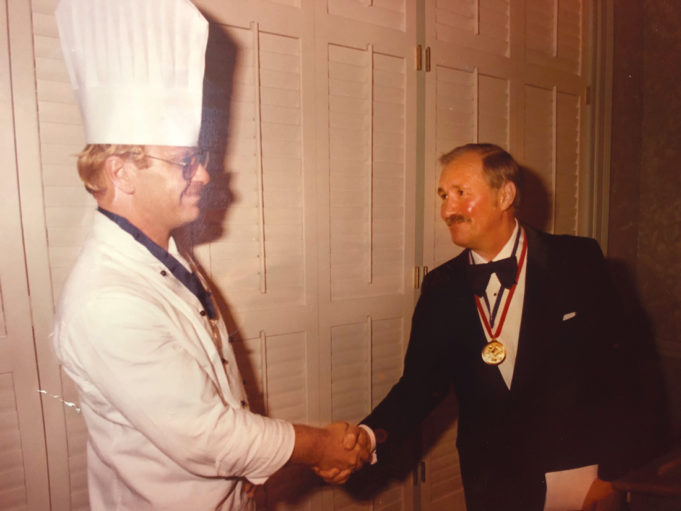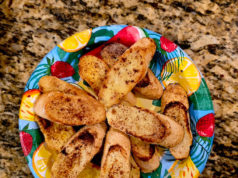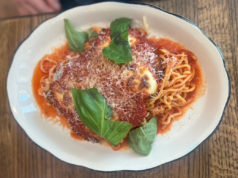No one will ever adequately eulogize Walter Kaufmann. It’s impossible. The made-for-film life of the iconic chef, restaurateur, trailblazer, historian, and bon vivant ended peacefully on Tuesday, Sept. 22, at the age of 91. He was surrounded by loved ones.
Upon checking him into the hospital last week, his wife Glenda Kaufmann said she hurriedly sought out the doctor to ask about Walter’s wellbeing. The doctor assured her he was comfortable and “flirting with the nurses” in the room where he slipped away to that great kitchen in the sky. Even at death’s doorstep, Walter radiated irresistible charm.
Glenda said that in his final moments, Walter thought of the restaurant he owned for 30 years. Since he was a teenager growing up in Lucerne, Switzerland, Walter dreamed of opening a restaurant like the Old Swiss House, an eatery that he passed on his way to school every day. After answering an ad in a Swiss newspaper, Kaufmann came stateside, eventually making his way to Fort Worth and working stints at the Colonial and Ridglea country clubs before realizing his dream in 1964.
The European-style eatery set Fort Worth’s palate for years to come. When his Old Swiss House opened, there weren’t many nice dining options for people celebrating special occasions. In his restaurant’s swanky environs, people from all walks of life luxuriated in then-exotic dishes like filet goulash and Veal Oscar. Walter’s gregarious disposition was just as big a draw as the food. Ever the showman, the charismatic chef paraded through the dining room, greeted guests, and occasionally joined a table of friends for a quick sip of wine. Walter was a local celebri-chef before that now-common convention existed.
After his restaurant closed in 1993, Walter retired for about seven minutes until Louise Lamensdorf lured him back into the biz at her namesake Bistro Louise, where he ran the dining room. That’s where I met Walter. As a hungry undergrad waitstaffer (and then grad-school student), I was drawn to Walter’s youthful energy, adaptable wit, and breadth of knowledge. He wasn’t just some washed-up mascot trotted out to draw the nostalgic gray-haired crowd. He knew his shit. And oh, my god he had stories.
At Bistro Louise, Walter reconnected with old friends and Swiss House patrons. He was also able to reach legions of second-generation fans, too. I can’t tell you how many times I heard some variation of, “The first white-tablecloth restaurant I ever visited was the Old Swiss House,” or “My parents took me to your restaurant for my seventh birthday, and now I’m a chef.” Those comments usually opened the door for Walter’s story time — and almost always ended with a toast. The man could work a room.
He and I met with select other Bistro staffers every Monday for a standing happy hour at a local cigar bar. The stories flowed like the many bottles of wine we killed every week. Walter was never more in his element than when surrounded by restaurant folk swapping war stories and dirty jokes. No one could top his. Of course, the festivities were constantly interrupted by random fans of Walter’s who ambled by to kiss the ring. Though he pretended otherwise, those interactions meant the world to him. Hanging out with Walter at a cigar shop patronized by mostly older men from Fort Worth was how I imagined visiting Abbey Road with John Lennon must have felt.
After a nine-year run at Bistro Louise, Walter went on to work at Fresh Point Dallas, a high-end food distributor. He was their chef ambassador, which basically gave him free rein to check in on local restaurants. His legend grew with every young chef, waiter, and prep-cook he encountered. Through his gig at Fresh Point — and his leadership roles at various chef and restaurant associations — Walter’s legacy shifted from culinary icon to mentor. There was nothing disingenuous about his interactions at restaurants. He cared about the busboys and dishwashers as much as he did the chefs and owners.
Walter and I kept in touch over the years, occasionally going to lunch or grabbing a glass of wine at happy hour, against his doctor’s orders, of course. As a journalist, I wrote a few stories about him — not because I wanted to keep his legend alive but because he just kept doing meaningful, newsworthy things.
Over the course of the last decade or so of his life, Walter set out to preserve the history of Fort Worth dining by founding the Culinary Library of Texas, a vast collection of restaurant menus and cookbooks by local authors, housed at the Tarrant Area Food Bank. It’s one of about a half dozen charitable endeavors with which he was connected. He was awarded too many times to list, but I know he was most proud of having the Fort Worth Food + Wine Foundation’s Lifetime Achievement Award named after him. He was also the award’s first recipient in 2015.
There is no question our current restaurant scene wouldn’t have blossomed the way it did without Walter’s guiding influence. Restaurant people in this town have a sense of camaraderie and support one another like I’ve never seen anywhere else. I think that’s Walter’s greatest legacy. It wasn’t enough for him to be an amazing chef, restaurateur, manager, and ambassador. He shaped a community and held the door open for those behind him.













Always enjoyed Bistro Louise–another by gone legendary place. Louise is a FW treasure! Thanks for this article on Walter Kaufmann.